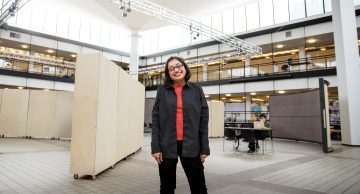Story
Think Bigger. Think Differently: Malini Srivastava
Learn where Malini Srivastava (BF’14) rekindles her inspiration and drive

Growing up in India, Malini Srivastava (BF’14) spent every summer at her grandma’s house. The house, shared with family and friends, centered around a beautiful outdoor courtyard. This was the gathering space: hordes of cousins chasing each other around, a table piled with food — “Someone was always eating!” Malini says with a laugh — dishes of puris (fried bread), curry, rice and lentils, all shared in the warm sunlight. At night, the cousins giggled and pretended to sleep on the cool tile, the stars overhead.
Srivastava carried the magic of that courtyard with her when she left to study architecture at the University of Minnesota. She was intrigued by the idea that certain physical spaces foster creativity and connection. It wasn’t long before she discovered her favorite spot on campus: Rapson Hall Courtyard.
This indoor courtyard is spacious and sunwashed, surrounded by balconies and buzzing with conversation. “This place personifies what creativity is all about,” she says. “It’s unfettered by expectation, where no one limits the questions you ask.”
The spirit of the courtyard allows for a variety of uses. One week, Srivastava and her class constructed a two-story structure in the space to experiment with sound waves. The next week, she attended an elegant art exhibition in the same setting. After taking a class of students to India, they shared stories from the trip in the courtyard. And when she completed her graduate studies, this was where Srivastava presented her master’s thesis.
Srivastava’s experiences in spaces like Rapson Hall Courtyard inspire her to focus on the needs of her community and how she can meet them creatively. An active architect who just won an American Institute of Architects’ 2018 Young Architects Award, she is currently earning her doctoral degree at Carnegie Mellon University. Her brainchild — eFargo, an energy-saving initiative in Fargo-Moorhead that is estimated to have already saved the city $3.2 million — recently won a $5 million prize in a national energy savings competition.
“Every pursuit needs a physical and mental space,” she says. “We need space that isn’t programmed, space for breakthroughs. Space to think about what’s missing, and what needs to happen.”
Continue reading
-

Story
Initiating changemakers
How the Initiators Fellowship supports business enterprises that prioritize social and environmental good throughout Greater Minnesota.
-

Note from Jen
Note from Jen: Acknowledging and learning from the boarding school era
The Bush Foundation was invited to the gathering at Gila River...
